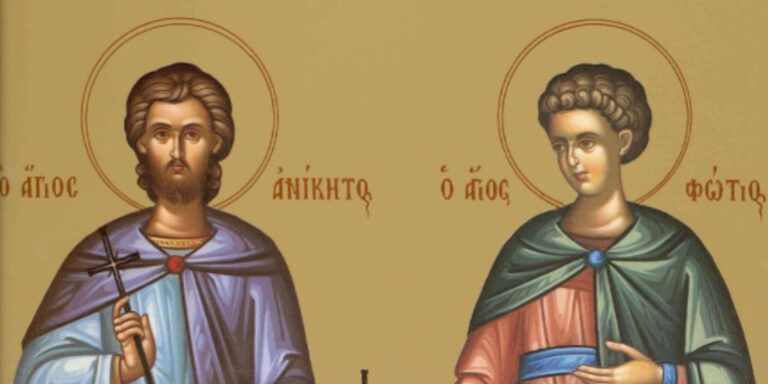The Martyrs Anicetus and Photius, natives of Nicomedia, bravely stood up against the emperor Diocletian’s persecution of Christians. Anicetus, a military official, condemned the emperor for his cruel acts, leading to his own torture and condemnation to be devoured by wild beasts. However, the wild animals showed him mercy and did not harm him.
Various attempts to execute Anicetus failed miraculously, such as the lions becoming gentle, fires going out, and boiling tin turning cold. Even when thrown into a furnace, the saints remained unharmed, inspiring many pagans to convert to Christianity.
Photius, Anicetus’ nephew, also faced persecution for his faith and stood by his uncle throughout the trials. Both martyrs endured intense torture but remained steadfast in their beliefs, ultimately sacrificing their lives in a fiery furnace.
Their steadfast faith and miraculous protection in the face of persecution led many pagans to believe in Christ. The bodies of Anicetus and Photius remained unharmed even after being consumed by fire, solidifying their status as revered saints.
These martyrs are remembered in the prayers for the Blessing of Oil and the Lesser Blessing of Water, showcasing their enduring legacy in the Christian faith.

Emperor Diocletian’s brutal persecution of Christians in Nicomedia led to the valiant stand of Anicetus and Photius, who defied the emperor’s orders and professed their faith in Christ. Despite facing severe torture, including having his tongue cut out, Anicetus continued to speak by the power of God.
Photius, witnessing the miracles and endurance of Anicetus, also declared himself a Christian and faced persecution alongside his uncle. Their unwavering faith led to their imprisonment and eventual martyrdom in a fiery furnace, where they were joined by many other Christians who willingly followed them into the flames.
The prayers of the Christians praising God during the martyrdom in the flames resonated from the furnace, inspiring many pagans to convert to Christianity. The bodies of Anicetus and Photius remained unharmed by the fire, further solidifying their status as revered saints.
These martyrs are invoked in the prayers of the Sacrament of Holy Unction and in the Blessing of Water, symbolizing their enduring legacy in the Christian faith.
Source: vema.com.au

